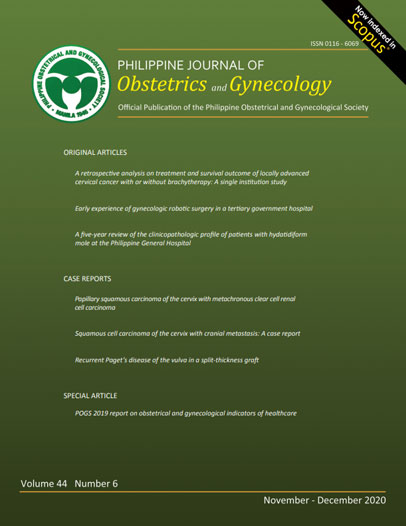Search for articles
Article Detail
The effectiveness of evening primrose oil gel capsule as a cervical ripening agent during labor induction as measured by bishop score on term singleton pregnant patient
Nina Nonette Diansuy, MD and Angela S. Aguilar, MD, FPOGS
Department of Obstetrics and Gynecology, Philippine General Hospital, University of the Philippines-Manila
Objective: To measure the effectiveness of evening primrose oil capsule as a cervical ripening agent by measuring the Bishop score before and 4 hours after intravaginal insertion of six capsules.
Methods: A quasi-experimental cross-sectional study was conducted from the period of May to July 2016 involving labor induction patients with a Bishop score ?4, an intact amniotic sac and a Biophysical profile score of 10/10 or 8/8.
Results: Thirteen patients had an average age of 27±6 years, and a mean age of gestation of 40±1 weeks. Seven patients (54%) were nulliparous, 2 (15%) were primiparous and 4 (31%) were multiparous. Seven patients (54%) had hypertension, 1 (8%) had diabetes mellitus, 5 (38%) had post-term pregnancies. A paired t-test was done to check for statistically significant changes in the Bishop score. Change in the Bishop score from baseline to 4 hours after insertion of evening primrose oil capsules was statistically significant (p=0.001). Eleven patients (85%) had improvement in the Bishop score after 4 hours, 4 (31%) of which had a clinically significant change in the Bishop score (?4). Specifically, there were statistically significant changes in the dilatation (p=0.027),
effacement (p=0.006) and consistency (p=0.002). The mean birth weight of deliveries was 3192±351 grams. Nine patients (69%) underwent primary low segment cesarean section, six (46%) of which for nonreassuring fetal status, 2 (15%) for arrest in cervical dilatation, and 1 (8%) for intraamnionic infection. Four patients (31%) successfully delivered vaginally.
Conclusion: Results showed a positive effect on the Bishop score during cervical ripening although further studies are needed to establish direct correlation.
Current Issue
Search article

